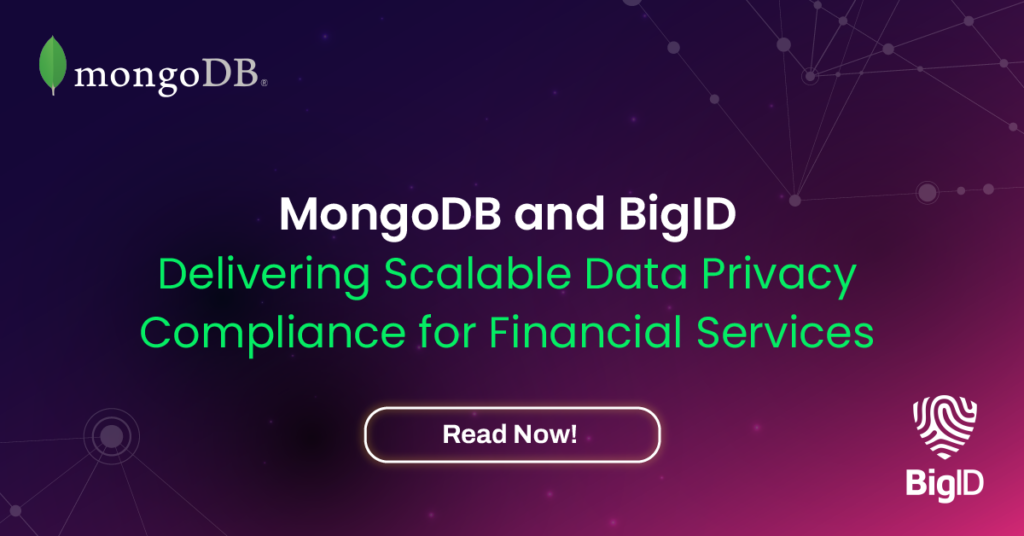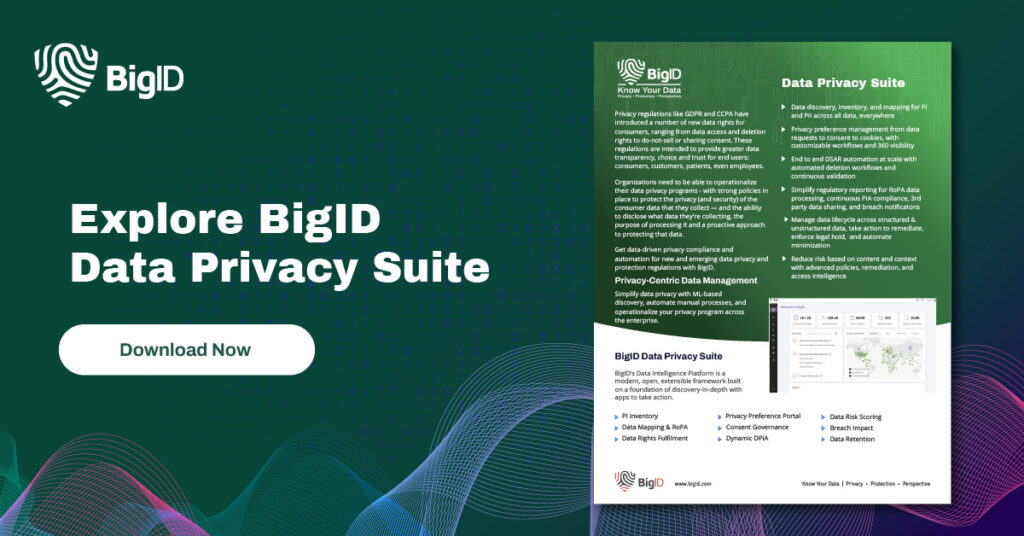Ensuring data privacy compliance has become a critical priority for banks and financial services. Safeguarding customer data is not only crucial for maintaining trust and reputation but also a legal and ethical obligation. In this blog, we will dive into why and how the financial services industry can adopt an approach to data privacy compliance effectively using BigID and MongoDB.
Embracing a Privacy-First Mindset
To establish a robust data privacy compliance framework, banks, and financial services must prioritize privacy from the onset. This entails adopting a privacy-first mindset throughout all aspects of their operations. Embedding privacy principles into the organizational culture helps create a foundation for compliance, ensuring that data protection is a core value rather than an afterthought.
Understanding the Regulatory Landscape
Compliance with data privacy regulations is an ongoing process that requires a deep understanding of the applicable legal landscape. Banks and financial services should invest in a comprehensive knowledge of regulations such as the General Data Protection Regulation (GDPR), California Consumer Privacy Act (CCPA), Digital Personal Data Protection (DPDP), and other relevant global and local regulations. This understanding helps organizations identify their obligations, assess risks, and implement necessary controls to ensure compliance.
Ensuring Compliance with Regulatory Requirements
Data privacy compliance requirements vary based on specific regulations applicable to state, region or country. Organizations must adhere to these regulator requirements as it is crucial to meeting legal obligations, maintaining trust and mitigating risks.
- Regularly Update Policies and Procedures: The data privacy landscape is constantly evolving, with new regulations and best practices emerging regularly. Banks and financial services should stay ahead of these developments to review and update their privacy policies and procedures accordingly. Regular audits and risk assessments should be conducted to identify gaps and ensure that the organization remains compliant with evolving requirements.
- Implement Data Discovery & Governance Frameworks: Effective data governance is a fundamental aspect of data privacy compliance. Banks and financial services should establish data governance frameworks with clear policies, procedures, and accountability mechanisms. This includes defining data ownership, identifying data across systems, implementing data classification, setting retention periods, and establishing secure data storage and disposal protocols. Regular audits and internal controls help ensure adherence to these policies and procedures.
- Streamline Consent Management: Transparency and consent are vital components of data privacy compliance. Banks and financial services should provide clear and easily understandable privacy notices to customers, outlining the types of data collected, the purposes of the processing, and any third-party sharing. Additionally, organizations should develop user-friendly consent mechanisms that enable individuals to make informed choices about their data.
- Fulfill User Rights and Data Subject Access Requests: All privacy regulations grant individuals various rights over their data, including the right to access, correct, delete, and restrict the sale of data. The fulfillment of data rights requires mechanisms such as customer self-service portals and automated workflows for data subject access requests.
- Conduct Privacy Impact Assessments (PIAs): Privacy Impact Assessments (PIAs) are essential tools for evaluating and mitigating privacy risks associated with data processing activities. Banks and financial services should regularly conduct PIAs to identify potential privacy concerns, assess the impact of data processing, and implement appropriate safeguards. PIAs enable organizations to proactively address privacy risks, demonstrate compliance, and enhance transparency in data processing practices.
- Prioritize Data Minimization and Purpose Limitation: Collecting and processing only the necessary personal data is a key principle of data privacy compliance. Banks and financial services should adopt data minimization strategies, limiting data collection to what is essential for legitimate business purposes. Furthermore, data should be processed only for specific, clearly defined purposes and not repurposed without obtaining appropriate consent or legal basis. By embracing data minimization and purpose limitation, organizations can reduce privacy risks and respect individuals’ privacy preferences.
- Navigate Data Localization & Transfers: Data localization involves keeping data within the jurisdiction where it was collected. While this approach can help ensure data protection, it can also create challenges for businesses that operate in multiple countries. Implementing data localization practices ensures that customer data remains within the country’s boundaries as well as adhering to cross-border data transfer requirements.
- Strengthen Security Measures: Protecting customer data from unauthorized access, breaches, and cyber threats is crucial. Banks and financial services should implement robust security measures, including encryption, access controls, intrusion detection systems, and regular security assessments. Ongoing staff training on cybersecurity awareness and best practices is essential to mitigate the risk of human error or negligence.
Achieving Privacy Compliance with BigID and MongoDB
Financial institutions need the ability to find, classify, inventory, and manage all of their sensitive data, regardless of whether it’s on-prem, hybrid-cloud, or cloud-based. Organizations must know where their data is located, replicated, and stored — as well as how it is collected and processed, it’s a momentous task — and requires addressing common challenges like siloed data, lack of visibility and accurate insight, and balancing legacy systems with cloud data. All while meeting a litany of compliance requirements.
With a major shift towards geographically dispersed data, organizations must make sure they are aware of – and fully understand – the local and regional rules and requirements that apply to storing and managing data. Organizations without a strong handle on where their data is stored potentially risk millions of dollars in regulatory fines for mishandling data, loss of brand credibility, and distrust from customers.
A modern approach relying on modern technologies like BigID & MongoDB helps to solve data privacy, data protection, and data governance challenges.
BigID, the industry leader for data security, privacy, compliance, and governance, is trusted by some of the world’s largest financial institutions to deliver fast and accurate data discovery, classification, and correlation across large and complex data sets. BigID utilizes MongoDB as the internal data store for the platform to help generate data insights at scale, automate advanced discovery & classification, and accommodate complex enterprise requirements. As technology partners, MongoDB’s document model and distributed architecture enable BigID to deliver a scalable and flexible data management platform for data privacy and protection.
How BigID Powered by MongoDB Addresses Privacy Compliance Challenges
By taking a privacy-first approach to data and risk, organizations can address the challenges of continuous compliance, minimize security risks, proactively address data privacy programs, and strengthen data management initiatives. BigID, powered by MongoDB, helps organizations identify, manage, and monitor all personal and sensitive data activity to achieve compliance with several data privacy requirements. Organizations get:
- Deep Data Discovery: BigID helps organizations discover and inventory their critical data, including financial information. This enables organizations to understand what data they have and where it is located, which is an important first step in achieving compliance.
- Accurate Classification: With exact value matching, BigID graph based technology can identify and classify personal and sensitive data in any environment such as email, shared drives, databases, data lakes, and many more.
- Efficient Data Mapping: Automatically map PII and PI to identities, entities, and residencies to connect the dots in your data environments.
- Streamlined Data Lifecycle Management: Accurately find, classify, catalog, and tag your data and easily enforce governance & control – from retention to deletion.
- Fulfillment of Consent & Data Rights Request: Automate consent and data rights management with a privacy portal that includes a seamless U/X that manages data subject rights requests (DSAR). Centralize DSAR’s with automated access and deletion workflows to fulfill end-to-end data rights requests.
- Effective Privacy Impact Assessments (PIA/DPIA): Easily build seamless workflows and frameworks for privacy impact assessments (PIA) to estimate the risk associated with all data inventory.
- ML-based Data Access Management: For full compliance with specific requirements, BigID helps mitigate risk with significant open-access requirements to remediate file access violations on critical data across all data environments.
- Validated Data Transfers: Monitor cross-border data transfers and create policies to enforce data residency and localization requirements.
- Effective Remediation: BigID helps to define the remediation action related to critical data to provide audit records with integration to ticketing systems like Jira for seamless workflows.
By adopting a privacy-first approach to data and risk, financial services organizations can tackle the challenges of continuous compliance, mitigate security risks, and enhance data management initiatives. BigID, powered by MongoDB, offers comprehensive solutions to help organizations identify, manage, and monitor personal and sensitive data activities, enabling them to achieve compliance with various data privacy requirements.
Looking to learn more about how you can reduce risk, accelerate time to insight, and get data visibility and control across all your data – everywhere? Take a look at the below resources:
- Control your data for data security, compliance, privacy, and governance with BigID
- Data-driven privacy compliance and automation for new and emerging data privacy and protection regulation
- Protect your data with strong security defaults on the MongoDB developer data platform
- Manage and store data where you want with MongoDB
- MongoDB for Financial Services


